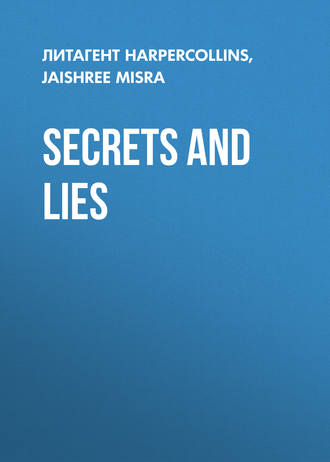
Полная версия
Secrets and Lies


JAISHREE MISRA
Secrets and Lies

Copyright
This novel is entirely a work of fiction. The names, characters and incidents portrayed in it are the work of the author’s imagination. Any resemblance to actual persons, living or dead, events or localities is entirely coincidental.
AVON
A division of HarperCollinsPublishers 1 London Bridge Street London SE1 9GF
www.harpercollins.co.uk
First published in Great Britain by
HarperCollinsPublishers 2009
Copyright © Jaishree Misra 2009
Jaishree Misra asserts the moral right to be identified as the author of this work
A catalogue record for this book is available from the British Library
All rights reserved under International and Pan-American Copyright Conventions. By payment of the required fees, you have been granted the non-exclusive, non-transferable right to access and read the text of this e-book on-screen. No part of this text may be reproduced, transmitted, down-loaded, decompiled, reverse engineered, or stored in or introduced into any information storage and retrieval system, in any form or by any means, whether electronic or mechanical, now known or hereinafter invented, without the express written permission of HarperCollins ebooks
HarperCollinsPublishers has made every reasonable effort to ensure that any picture content and written content in this ebook has been included or removed in accordance with the contractual and technological constraints in operation at the time of publication
Source ISBN: 9781847561688
Ebook Edition © 2009 ISBN: 9780007331642
Version: 2018-06-18
This book is dedicated to all my girlfriends, but most
especially Qubra, who never minded that I regularly
swiped her lunch back at school…
With rue my heart is laden For golden friends I had, For many a rose-lipt maiden And many a lightfoot lad. By brooks too broad for leaping The lightfoot lads are laid; The rose-lipt girls are sleeping In fields where roses fade.
A.E. Housman
Contents
Title Page
Copyright
Prologue
Chapter One
Chapter Two
Chapter Three
Chapter Four
Chapter Five
Chapter Six
Chapter Seven
Chapter Eight
Chapter Nine
Chapter Ten
Chapter Eleven
Chapter Twelve
Chapter Thirteen
Chapter Fourteen
Chapter Fifteen
Chapter Sixteen
Chapter Seventeen
Chapter Eighteen
Chapter Nineteen
Chapter Twenty
Chapter Twenty-One
Chapter Twenty-Two
Chapter Twenty-Three
Chapter Twenty-Four
Chapter Twenty-Five
Chapter Twenty-Six
Chapter Twenty-Seven
Chapter Twenty-Eight
Chapter Twenty-Nine
Chapter Thirty
Epilogue
Acknowledgments
About the Author
About the Publisher
Prologue
DELHI, 2008
Victoria Lamb sealed the last of her letters and placed it on top of the small pile. Then, steadying herself on the arms of her wooden swivel chair, she eased herself up from the writing bureau where she had been sitting since dawn and walked across to the French windows. Flexing her stiff hand, Victoria parted the old curtains at their faded central strip and blinked as Delhi’s sharp summer sunshine flooded in. The rose garden, denuded of flowers, lay thorny and colourless, dust stubbornly clinging to everything: the leaves, the trees, Lily’s stone grave at the bottom of the garden. Beyond the hedge and through the smog haze, the mansard roof of the school building with its squat clock tower was just visible. Emptied of its student population, the old Edwardian building had lain silent for the last six weeks, with only the occasional flitting figure of a nun disturbing the dark peace of the convent’s corridors.
Tomorrow the new term would start in its usual clamorous manner, beginning with the distant rumble of school buses approaching the gates. A pleasant enough sound, but one that unfailingly lapsed into belligerence as the bus drivers competed with the private cars that brought the more affluent pupils to school. That was when the ear-shattering revving and grinding of engines invariably began. The bus drivers were mindful of Miss Lamb’s strict ‘No Horns’ policy but, despite the occasional sternly worded home-circular, there was little she had been able to do about the strident car horns, the expression of self-importance that flowed from Delhi’s wealthy to their chauffeurs.
Far more forgiveable were the children’s shrieks that would assail Victoria’s ears at precisely half past seven, when the first of the school buses would disgorge its passengers just as she was sitting down to her breakfast of one poached egg and a slice of unbuttered toast. But the girls knew well enough to keep their voices hushed once they were inside the school building, or when they saw Miss Lamb passing through the grounds from the cottage at the edge of the school. That was indeed the best time of the day for Victoria—and had been for many years—the moment at which she cut across the quadrangle, saying hello and sometimes stopping to speak to a passing student, while the aroma of coffee wafted in the air alongside muffled laughter from the staff room. Victoria felt a small rush of gratification at the thought that she would be experiencing that familiar glow at roughly this time tomorrow. And then she reminded herself that tomorrow was to be the very last time she would be at St Jude’s to see the start of term.
Victoria sighed, not for the first time in the day, before turning away from the window. How could she pretend it would not be hard to leave all this? Fifty years at Jude’s; it had become her life! Her smile was rueful as she walked slowly around the living room of her little cottage, making mental notes about what she would need to give away or pack. Not that she would miss everything about the life of a school principal, of course. The job had been robbed of some of its joys along the way, not least because St Jude’s—with its very old reputation of turning out stylish and well-spoken young ladies—had in recent years become the choice of noveau-riche Delhi business families who merely wanted their daughters to speak English properly, thereby acquiring a sheen of sophistication. The school population had certainly enjoyed a more healthy mix when Victoria had first arrived here, college professors and government servants then seeming more able to afford the fees for their children than these days. But competition from those exclusive day-schools springing up in South Delhi had led to St Jude’s management deciding to install air-conditioning in its gym and library ten years ago, and now a gleaming indoor swimming pool was being built on the site of the old chapel. Victoria had tried to argue that the soaring fees would invariably lead to falling academic standards, but the only concession management would make was to increase the number of scholarship students from one a year to two. Her point had been amply proven over the years, but it brought no satisfaction to Victoria whenever she saw how the quality of Jude’s alumni had fallen. Running a finishing school was not what Victoria had had in mind for herself at all!
Back at her bureau, Victoria riffled through her small stack of letters, studying the names and addresses. She had tracked them down more easily than she had initially thought possible. Her girls. Somehow she continued to think of them as her special girls, despite the thousands that had since passed through the school. They had, in fact, been dubbed ‘Miss Lamb’s crème de la crème’ the year the school had performed The Prime of Miss jean Brodie as a play. She corrected herself: ‘Lamboo’s crème de la crème’, for that was what the girls had always called her. Never to her face, good God, no! Far be it for her to allow that kind of familiarity. Besides, her popularity notwithstanding, the students respected her too much to take those sorts of liberties. She had never particularly minded being called Lamboo. It wasn’t malicious, merely an affectionate twist to the Hindi word that aptly described her tall and willowy figure. Victoria Lamb had, in fact, discovered her nickname from one of her first batches at St Jude’s, once they had passed out of the school and returned en masse to pay their respects one day. Yes, one way or another, they always came back. Even if only to seek admission for their own daughters.
Victoria tapped the envelopes on the wooden surface, her face turning pensive as she remembered her batch of ’93 and the dreadful events of that year. She had another night to decide whether to post these letters or not as the school peon would turn up on his bicycle at nine o’clock to take her mail to the post office. Agonising over this decision for days, she had tried imagining how the letters would be received by those four girls who had so deliberately never returned to the school.
Victoria still saw them in their grey-crested blazers and knee socks, even though they would be in their early thirties now, women of the world, married…some with children, she knew, and husbands and jobs. Every so often, a snippet of news about one of them would arrive, either via one of their old classmates, or in the pages of those glossy gossip magazines she leafed through while sitting in the dentist’s waiting room.
Victoria understood perfectly why they had never come back, of course. The reason lay in that lonely grave at the bottom of her garden. Why, she herself had nearly left St Jude’s after Lily’s death, unable for weeks to step into the rose garden without remembering that terrible December night—and the sight of Lily as she lay on the damp earth speckled with freshly fallen petals. The picture had been imprinted on Victoria’s memory forever: Lily’s sequined dress pooling around her body like water and her face, her beautiful face, not yet drained of colour, turned up to the sky as though admiring the stars.
It was Lily’s unblinking eyes that had first given it away.
That, and the blood seeping over the side of her head.
Chapter One
LONDON, 2008
The letters arrived at their destinations almost fifteen years after the death of Lily D’Souza.
The first to receive hers was Bubbles Raheja, as she sat curled up on a divan in the morning room of her palatial Belgravia home. She was in a state of unusual tranquillity that morning, as none of the family were at home and, consequently, she was painting her toenails a cheery post-box red when the maid brought in the mail. Generally it was Sooki, the silent but ever-smiling Thai pedicurist at the discreet little salon tucked away in a Mayfair side street, who tended to her nails, but, sometimes, doing little tasks like this for herself gave Bubbles an odd sort of pleasure that she struggled to explain. On one level it transported her instantly back to her teenage years in Delhi when she and her sisters would squabble over the last congealing dregs of Toffee Pearl, sometimes having to mix it with Cinnamon Brown and a few drops of nail-polish remover to get it to spreading consistency. But, these days, Bubbles manicured her own nails as a form of rebellion; the only kind of rebellion Bubbles ever mounted against her husband and in-laws: quiet and private and completely inconspicuous. She knew how deeply Binkie would loathe the sight of his wife sitting in as public a space as the living room performing such an ungainly task for all the house staff to behold, but that was exactly what made it so agreeable. Of course, her timid insurgence was a bit wasted, given that Binkie wasn’t around to witness it—but then Bubbles had long grown used to making do.
She smiled at the maid and ordered a cup of elaichi tea before gesturing for the pack of mail to be left on the inlaid marble foot-stool at her elbow. Then she returned to the unfamiliar job at hand, frowning as she concentrated on getting the second coat just right. It was only ten minutes later, when the maid carried the tea-tray in and tried to make room on the small stool crowded with bottles of varnish and thinner and balls of cotton wool, that the pack of unread mail fell to the floor and Bubbles spotted the plain white envelope. The sender’s address typed onto a label in the lower left-hand corner instantly caught her attention. How could it not? The nail-polish brush was hastily discarded as Bubbles reached down to pick up Miss Lamb’s letter. She did not notice until much later that a drop of varnish had fallen onto one of the cream silk cushions, forming a permanent testament to her guilt—a round red blotch that rather fittingly resembled a small splash of blood.
A little later that same morning, Samira Hussein also looked disbelievingly at the envelope in her hand. It had her Kensington address and postcode absolutely right, which in itself was surprising. Was it her imagination or had her fingers actually started trembling as she read the contents twice over? She looked at her reflection in the hall mirror and was startled by her own stricken expression. The cloying, sickening smell of the Gallica roses in their cut-glass vase suddenly filled her nostrils. She cast a baleful look at their perfect velvet folds. Sam never normally bought roses—there was good reason for that—but this bouquet had been given to her by Akbar’s boss who had been invited to dinner last night, and the maid must have thought she was being useful by replacing the more customary gladioli with them. Sam picked up the telephone. If there ever was a time to break the old pact of silence, it was this. She did a quick count on her fingers even though she already knew—fifteen years this winter. She waited, desperately willing Bubbles to answer the phone, but by the seventh ring Sam knew it was useless.
‘This is the Orange voicemail service. The number you are trying to reach is currently switched off. Please leave a message after the tone’.
Why did they always use such annoyingly nasal voices for automated messages, she thought illogically, and where on earth was Bubbles; she had usually risen by midday. Sam looked at her watch and guessed that her friend was either in the sauna or having a massage, or aromatherapy, or whatever she was on these days. Bubbles hardly ever turned her mobile phone off, the damn thing usually an ever-present appendage to her left hand or ear, but now Sam had no option but to call Anita. She was normally most reluctant to bother anyone who had an actual career on a weekday morning, but this was important.
‘Sam,’ she heard Anita’s habitually brisk voice a mere second after the phone rang, ‘can it wait, darling? It’s coming up to the hour and the bulletin…’
‘I know, I know, I wouldn’t have, but I just wanted to know if you’ve had the letter too.’
‘Letter?’
‘I’ve just had a letter from Lamboo.’
She heard the silence before Anita spoke, her voice incredulous.
‘Lamboo? After all these years! Whatever for?’
‘Oh God, I’m so sorry, Anita, I know I shouldn’t have rung when you have to be on air in…what is it, ten minutes? Shall I call back later?’
‘Yes…no…Sam, wait! Just quickly, what sort of letter is it?’
‘It’s an invitation to some kind of reunion at the school, I think. Doesn’t say very much…’
Anita let out a long breath. ‘Fuuuck,’ she whispered.
‘I know. I haven’t stopped shaking since opening it,’ Sam replied.
‘Look, shall I come around this evening? Or, if you can, would you pick me up from work? Five-ish? We’ll get a drink around here somewhere.’
‘Okay, I’ll get Bubbles too. Speak later…and don’t think about it if you can help it.’
She heard Anita emit a short laugh before hanging up. Sam marvelled when, ten minutes later, she heard her friend’s clipped and measured accent deliver the lunchtime news on her kitchen radio as though it were just another day.
At exactly three minutes past the hour, Anita Roy pulled down the faders on her newsroom console and clicked the button that would transfer listeners to the continuity announcer. Luckily she knew the routine so well that she no longer had to concentrate on what she was doing. She pushed her headphones off and they lay against her neck, crackling with the tinny faraway voice of the girl who did the programme trails as Anita sank her head into her hands. Fifteen years on and the memories still lacerated her on certain days. Not, oddly, when she’d had a bad day and was tired and tense, but the very reverse. It was invariably whenever something tremendous happened: a promotion, a new man, even the day she got the keys to her first flat. It was exactly in those brilliant, luminous moments, when life seemed filled with the sweetest prospects, that Lily unfailingly returned. Not just a passing memory of her, but the sight—as clear as anything—of her pale face and the way she had looked at her that night in the rose garden, moments before she had died.
MUMBAI, 2008
Miss Lamb’s letter to Zeba Khan had been delivered to the film star’s Juhu address the previous week, but it would be another few days before Zeba herself would see it. The letter had nearly got lost, nestled as it was alongside many others in the customary gunny bag. The local post office, accustomed to receiving fan mail addressed sometimes just to ‘Zeba, Bombay’, had taken to using a pair of large sacks to deliver her mail. That day’s load had been an exceptionally heavy one and Zeba Khan’s secretary, Gupta, had already spent an extra hour trying to clear it. He resisted the temptation to throw the last rubber-banded clutch into the bin so that he could finally leave to catch his train to Ghatkopar. It was his main task every day to wade through his employer’s fan mail, answering each one with a standard letter of appreciation, a photograph of the film star showing just a hint of her famed cleavage and a carefully forged signature. Gupta sometimes wondered about that signature of his, the carefully crafted Z, the flourish as the A ended in a small cross, musing over its many grateful recipients. One persistent correspondent had even written back to say that he kissed the signature every morning before leaving for work as a porter at Victoria Terminus, convinced that it gave him strength.
Gupta picked up the last letter, eyeing the cheap envelope and handwritten address, resisting once again the urge to hurl it into the trash can unopened. Madam received all sorts of invitation cards: premieres, parties, even weddings and baby-naming ceremonies, as though her fans really thought she was as sweet as her roles made her out to be, and very eager to drop by their family function if she happened to be passing. He knew, of course, better than anyone else, that Madam rarely stirred out of bed for anything less than five lakh rupees these days. He sighed deeply as he slit open the envelope. She had maintained an uncanny knack of finding out if he had shirked any of his tasks and, having no wish to receive one of her verbal lashings, he surveyed the letter before deciding how to respond. This was an unusual one, not the kind of thing Gupta had ever had to deal with before. Certainly not a request that could be fobbed off with a signed photograph showing some cleavage. He held the letter briefly in his hand, reading it again more carefully The address and postmark looked authentic, and this Miss Lamb apparently knew Zeba Madam well. He could not assume that Madam would not want to reply to the letter herself, or perhaps despatch a box of her trademark spray of orchids to its sender, for that was what she sometimes did when she wanted to turn someone down without making it too blatant they were being turned down.
It had become obvious to Gupta over the years that Madam was not in touch with anyone from her Delhi childhood, not even her family, so this was rather intriguing. And she was, in fact, due to be there in December for the annual Film Awards, for which they already knew she was receiving the Best Actress prize. This might be the kind of distraction from her routine that she would enjoy, it would perhaps even present some good PR and photo-shoot opportunities. Gupta remembered having once, in his early and more enthusiastic days, suggested to Zeba Madam that her fans would probably love to know more about the kind of school she had attended and people she had studied with, that being the kind of insignificant information that usually thrilled her silly admirers no end. But she had flown at him in a sudden rage, dismissing his idea as being ‘stupid’ and ‘thoughtless’. Gupta had never again strayed into what was clearly sensitive territory.
He looked at the letter again, deciding to leave it casually on Madam’s bedside table. She would not miss it lying there when she returned later tonight from Zurich, where she had gone to shoot a song sequence.
Chapter Two
LONDON, 2008
Despite the tumult of painful memories that had been sparked by the arrival of Miss Lamb’s letter, Sam managed to get through the rest of her day maintaining her normal placid demeanour. It was nearly two when she finally managed to speak to Bubbles, but her friend was uncharacteristically reticent about explaining why she hadn’t taken her calls. Bubbles too had received Miss Lamb’s letter, and Sam could tell, from what sounded like a blocked nose, that Bubbles had been crying. Not wanting to discuss it on the phone, Sam merely told Bubbles the time and place that had been agreed with Anita before hanging up.
Luckily it was time to collect Heer from school, and Sam left her house with relief, pulling on a cashmere cardigan as protection against the stubborn chilliness in the air. She looked up at the watery sun as she closed the gate behind her, trying to take pleasure in its rare appearance. What a dismal summer it had been so far, even the daffs that had struggled to emerge in the back garden a month ago had turned brown and soggy and collapsed within days. It was as if life itself was fighting to cope against all odds.
Sam turned as she heard a familiar voice hail her and saw her neighbour emerge from her driveway.
‘Hey, Franci,’ she said pleasantly, although she couldn’t help taking in the sight of Francesca’s trim legs beneath her summer dress with a rush of envy. Francesca had clearly worn such a short dress on a cold day only to show off her tan. She was maniacal about her fitness regime and had certainly earned every inch of her fabulous figure, but it was enviable to Sam, whose battle to curb her burgeoning weight was now taking on epic proportions.
Francesca took Sam’s arm in her usual friendly fashion and they walked down their leafy road together, meeting up with another pair of mums who were also school-bound.



